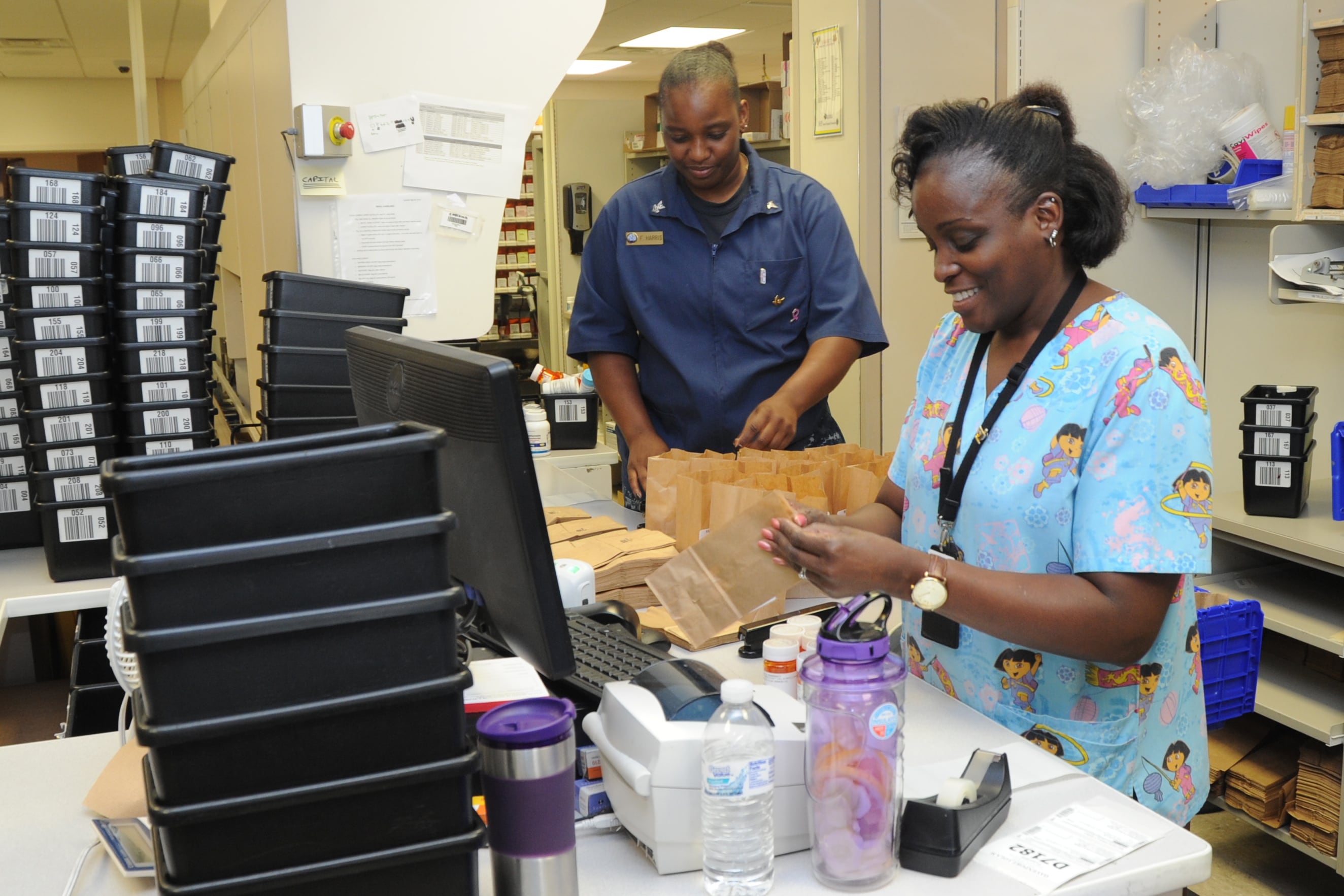Tricare beneficiaries who fill their prescriptions at a retail store or by mail will see their prescription costs rise on Jan. 1, and enrollment fees for most retirees and their family members on Tricare Prime also will increase next year.
For Tricare patients who purchase medicine at a retail pharmacy, prescriptions for a generic drug will cost $13 for a 30-day supply, up from $11, for a brand-name medication; $33, up from $28, and for a non-formulary drug — those not listed in Tricare’s library of covered medications — $60, up from $53.
Patients can save money on long-term prescriptions by using the Express Scripts mail order pharmacy, but those costs also will increase, from $7 to $10 for a 90-day supply of a generic medication, from $24 to $29 for a brand-name drug and from $53 to $60 for non-formulary drugs.
Annual enrollment fees for Tricare Prime also will rise for career retired service members and their dependents, but the amount of the increase has yet to be determined because it is based on the calculated cost of living adjustment for retired military pay, which is usually published in mid-October.
In 2018, the COLA increase was 2.9 percent and Tricare Prime enrollment fees were adjusted accordingly. Currently, these beneficiaries pay $297 annually for an individual and $594 for a family.
Surviving family members of sponsors who died on active duty or service members who are medically retired, and their families, are exempt from the increases as long as they remain in Tricare Prime.
RELATED

The fiscal 2017 National Defense Authorization Act made massive changes to Tricare, reorganizing the Defense Department’s health care benefit for active-duty families, retirees and their families, to include changes to enrollment fees, annual deductibles, copayments and catastrophic caps.
The changes were designed to help curb the rising costs of Tricare to the Defense Department, which, at the time, accounted for 52 percent, or $15.3 billion, of the total cost of care delivery in the military health system.
But the changes meant sticker shock for patients accustomed to lower out-of-pocket costs. In some cases, copayments more than doubled, enrollment fees inched upward and the pharmacy cost shares were set to rise until 2027.
“The bottom line is, Tricare pharmacy fees and other provider visit cost-shares and premiums for both Tricare Prime and Tricare Select are starting to squeeze beneficiaries,” wrote retired Navy Capt. Kathy Beasley, director of health affairs for the Military Officers Association of America, in an update to beneficiaries on the pharmacy increases in September.
“MOAA continues to press the DoD to show the results of how much revenue is being generated from beneficiaries and where it is being directed,” Beasley said.
Also increasing in 2020 are out-of-network pharmacy costs. Patients who don’t use a network pharmacy or who buy medications must meet their annual deductible. Those on Tricare Prime pay a 50 percent cost share for medications after paying their point-of-service fee. Those on other Tricare programs will pay 20 percent of the total cost or $29, whichever is higher for medications listed in Tricare’s formulary. For non-formulary drugs, they will pay 20 percent of the cost or $60, whichever is higher.
Active-duty service members will be reimbursed for out-of-network pharmacy fees.
In addition to pharmacy copayment increases and enrollment fee hikes, specialty populations within the Tricare system also will pay more, including reservists, young adults and transitioning service members.
Young adult children of military personnel using the Tricare Young Adult program will see their rates increase in 2020: those enrolled in Tricare Young Adult Prime will see monthly payments rise to $376, up from $358, while those on Tricare Young Adult Select will pay $228 a month, up from $214.
RELATED

Beneficiaries who use Tricare Reserve Select will see monthly premium increases. For one person, the monthly rate will cost $44.17, up from $42.83, and for a family, $228.27, up from $218.01.
Retired reservists in the Tricare Retired Reserve program actually will see their rates dip slightly in 2020. The roughly 7,000 former service members or their families in the program will pay $444.37 for a single person, down from $451.51, and $1066.26 for a family, down from $1083.40.
Beneficiaries new to the reserve programs will also see a change in their enrollment structure in 2020. Currently, new enrollees must pay two months of premiums in advance to enroll — nearly $2,200 for a retired reservist with a family. Beginning in 2020, the amount collected at enrollment will be left up to Tricare’s contractors, Health Net Federal Services and Humana Military.
For the second year, beneficiaries who want to switch between Tricare health care plans must do so within a set time window, called Open Season, which begins Nov. 11 and ends Dec. 9. During this period, eligible beneficiaries can enroll in Tricare Prime or Select if they have other insurance, can change plans, or, if they are satisfied with their current Tricare health plan, do nothing and remain enrolled.
If they don’t enroll or switch during Open Season, beneficiaries must wait until a “qualifying life event” to make changes, such as losing health insurance provided by another insurer, retiring, getting married or divorced, having a baby or adopting, moving, or aging out of Tricare, among other reasons.
More than 4.6 million beneficiaries are enrolled in Tricare Prime and nearly 2 million patients use Tricare Select. An additional 2 million beneficiaries utilize Tricare for Life, the program that acts as a second payer to Medicare for retirees age 65 or older.
Beasley said the MOAA will continue to raise its concerns about the rising costs of health care for military families and retirees to Congress, “especially if the consumer price index remains tame and retired pay and Social Security incomes stay flat.”
“MOAA intends to focus on, and to bring congressional attention to, any new Tricare fee increases as we continue to battle to reduce several past disproportional increases,” she wrote.
Have questions about Tricare? Call 1-800-538-9552 or learn more at Tricare.mil.
Patricia Kime is a senior writer covering military and veterans health care, medicine and personnel issues.





